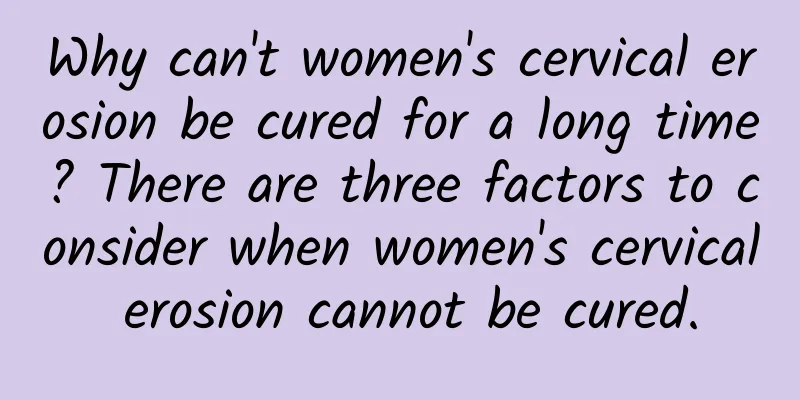Why can't women's cervical erosion be cured for a long time? There are three factors to consider when women's cervical erosion cannot be cured.

|
Doctors remind women that they should not have sex during their menstrual period, because sex at this time will make them more susceptible to gynecological diseases. Cervical erosion is a common gynecological disease that most women will have to varying degrees after marriage. As the pregnancy progresses, the levels of estrogen and progesterone in the pregnant woman's body continue to increase, causing the columnar epithelium of the cervix to migrate outward, tissue hyperplasia, and cervical erosion symptoms to significantly increase, which can easily cause vaginal bleeding; excessive sex, eating too much hot and irritating foods such as chocolate, peppers, longans, or hot pot can also aggravate bleeding symptoms. Be careful if cervical erosion is not cured for a long time 1. Severe lesions The larger the area of cervical erosion, the more likely the patient's condition will recur, and the higher the recurrence rate after treatment. Generally, mild to moderate cervical erosion has a high cure rate, and the condition can be well controlled; while women with severe cervical erosion have a low cure rate, but the recurrence rate increases accordingly. This shows the importance of early detection and treatment for the complete cure of the disease. 2. Incomplete treatment of cervical erosion Nowadays, cervical erosion is mostly treated with physical treatments such as laser, electric perm or microwave. In order to avoid damaging other tissues, the force used in the operation is generally light, and the treatment range is limited and relatively superficial. The diseased tissue at the erosion site cannot be completely destroyed, resulting in residual diseased tissue, which can cause recurrent attacks. 3. Frequent sexual life After a period of treatment, the symptoms of patients with cervical erosion will improve. However, if they have sexual intercourse too frequently during this period, bacteria may enter the vagina, inducing infection again, aggravating damage to the cervical epithelium and causing recurrence of cervical erosion after treatment. 4. Older age The long-term failure of cervical erosion to heal is also related to the patient's age. Generally, women under 30 years old have a lower recurrence rate after treatment of cervical erosion, while women over 30 years old have a higher recurrence rate. |
<<: How to treat cervical erosion best? The best treatment for cervical erosion in women
Recommend
How much does it cost to treat endometrial thickening?
For some common problems of endometrial thickness...
What harm does abortion do to the body?
Now that society is more open-minded, many unmarr...
How to treat pelvic effusion
How is pelvic effusion treated? Pelvic effusion i...
How to regulate cervical erosion
What is cervical erosion? The specific manifestat...
Let's take a look at the clinical manifestations of candidal vaginitis
Fungal vaginitis is a common type of vaginitis, s...
Patients with irregular menstruation should understand their care methods as early as possible
Irregular menstruation is a kind of female diseas...
How to diagnose vaginitis
How to diagnose vaginitis? The occurrence of vagi...
What diseases can cause pelvic peritonitis?
For women, they will certainly be attacked by som...
What are the symptoms of cervicitis
Cervicitis is one of the common gynecological dis...
Thirteen small food tips for hyperprolactinemia: Dairy products should be avoided in the diet
Hyperprolactinemia is the most common pituitary d...
What are the drugs for treating vaginitis?
What are the drugs for treating vaginitis? Vagini...
What are the hazards caused by ectopic pregnancy?
Patients with ectopic pregnancy should pay attent...
The harm of chronic cervicitis: it will increase the patient's chance of cancer!
Chronic cervicitis is very harmful. Female friend...
How should patients with pelvic inflammatory disease take care of the disease
Pelvic inflammatory disease is a gynecological di...
Can I get pregnant if my endometrium is thick?
Having a disease called endometrial thickness is ...









